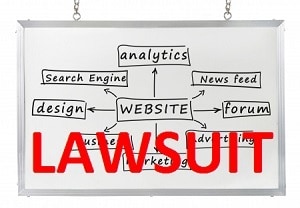 Although people seem to sue companies for just about any reason these days, too many business website owners create unnecessary risk of lawsuits because of their online content.
Although people seem to sue companies for just about any reason these days, too many business website owners create unnecessary risk of lawsuits because of their online content.
Here are five things you should check in order to reduce your chance of being taken to the cleaners in court.
1. Are your website’s legal documents up-to-date?
You should review your site’s website legal docs at least annually (more often if there are material changes in the site or Internet law). For example, your privacy policy should match your current method of collecting, storing and sharing data from website visitors and clients. Similarly, your site’s refund policy must accurately reflect how you handle client requests for a refund.
2. Do you have the legal right to use the content on your company website?
Just because you pay someone to create content for your site doesn’t mean you’ve got the legal right to put it there. Unfortunately, there are people who will rip off content from other websites and then charge you for the content as if they created it. Unless you’re using services like Copyscape and TinEye, chances are you won’t be the wiser that you’re paying for stolen content until the owner’s lawyer contacts you.
Perhaps the biggest intellectual property theft issue that costs website owners money is the use of photos and graphics found on the Internet. Just because you or someone who works for you can find a nice image online that fits your site doesn’t mean you have the right to use it. In most cases, there is a copyright owner out there whose permission must be obtained first before you can legally use the image (this usually involves paying for the use).
One of the easiest ways to avoid this type of risk is to use reputable stock photography sites, paying a licensing fee for use of each image you want to use. It’s better to pay a buck or two for an image license than get threatened with a lawsuit for $150,000 per copyright infringement and a shakedown offer of $5,000+ to make the matter go away.
3. Are your website testimonials and case studies stale?
For some products and services, testimonials and studies are evergreen, i.e. what the client or client says will be perpetually accurate. However, in many cases, what was said at the time becomes stale, inaccurate, or flat-out misleading over time.
This is particularly true if you’re selling a product or service related to technology or health. What was true about results or performance just a year ago may not be true today.
This means you should either update the old testimonials and case studies with new information from the client or replace them with more recent case studies and testimonials from other clients that are currently accurate.
4. Have you kept your business entity intact?
Many online entrepreneurs hate to deal with paperwork, particularly if it involves boring stuff like legal and tax issues. Unfortunately, this means it’s quite common for the limited liability company (LLC) or corporation that owns a website to become defunct because legal formalities were not observed and/or taxes were not paid (e.g. corporate franchise taxes).
If you’re handling your own site’s legal and accounting matters, rather than relying upon an Internet lawyer and accountant, be sure to put ticklers in your calendar to make sure you’re keeping your business entity in good standing. The failure to do so could be exposing yourself to a lawsuit as a sole proprietor and risking your personal assets (home, bank accounts, car, etc.) to satisfy any judgment against you in such a suit.
5. Are you protecting your client’s data from hackers?
No matter what size your online business is, you have a responsibility to protect your clients’ sensitive data. This can include credit card data and home addresses. If you’re selling health related products or services, you may also have HIPAA privacy compliance issues for your clients’ personally identifiable information (PII).
Let’s face it. It comes down to what you keep at the end of the day, not what you earn and subsequently lose.
Don’t throw away years of hard work by losing everything in a lawsuit that could easily have been avoided by take preemptive steps now to put the right website legal protections in place. If you have any questions, talk with your Internet lawyer, accountant, and tech security professional.
